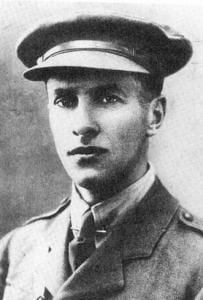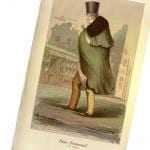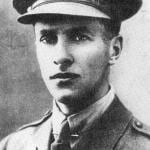 If you were told that smart Americans got their news in the New York Times about Communism in the Soviet Union from a man who was spent his youth worshiping with Aleister Crowley wouldn’t that seem unbelievable?
If you were told that smart Americans got their news in the New York Times about Communism in the Soviet Union from a man who was spent his youth worshiping with Aleister Crowley wouldn’t that seem unbelievable?
Who was Crowley?
In the early teens of the twentieth century, at the age of thirty-eight, Beast 666, the Great Magister, “the Wickedest Man in the World,” as Crowley alternately called himself. . .*
Drug user, misogynist, Crowley would spend a lifetime promoting things as twisted and base as he could make them. His very good friend Walter Duranty would tell the world what the imperialist butcher boys of the first World War wanted told, even if he lied to do so, and then went on a jaunt to Moscow where he told the stories that hooked him up to to the world, the flesh, and the power of devils. Stalin gave him what he wanted, so many dark things, and so the Pulitzer Prize winner happily gave Stalin what he wanted: a coverup of genocide. As Stalin cut deals with Hitler to partition Poland and sided with the fascists in World War II, Americans who got their news from the elite press, were sanguine about “Uncle Joe Stalin.” “Our man in Moscow” Walter Duranty told us that all was well.
If you thought that (just mayhap), Uncle Joe and Comrade Lenin had butchered millions, then you were a conspiracy theorist and not fit for Ivy League discourse. After all, you have to break a few eggs to make an omelette and if some nuns ended up dead in mine shafts, if a massive gulag of concentrations camps was built (and who could be sure if that was true?), then you perhaps have not noticed the full grain elevators, the pictures of happy children in schools (free!), university education for all (except those reactionary believers in God, but that is understandable given everything), and the avuncular nature of Joseph Stalin.
Did we tell you how bold, open, honest old Uncle Joe is?
Russia was no riddle: she was a freer, fairer, alternative to a failing West. If you pointed out that nobody much was moving to Moscow, that Moscow was committing mass murder as direct state policy, then the “what about-ism” began. What about this or that evil done by someone other than Uncle Joe? Why don’t you care about that other historic evil? Soon, in the hands of useful idiots, questions about Uncle Joe turned into support for the Spanish Inquisition.
Meanwhile, Duranty and his controllers in Moscow made sure that any genuine journalist who reported the news was crushed or marginalized. Duranty lied, but he lied like a gentleman with a proper education. The anti-communists were too often bluff, badly read, and inelegant. They lied (and too often they lied as well), then they lied like boobs from the bourgeoisie.
Read the book. Watch the movie.
Ask yourself, “Can you trust the establishment sources, right and left, today more than you could have in the mid-twentieth century?”
They lie:
Throughout his career Duranty would claim his only object as a journalist was “to find the truth and write it as best I could.” Yet despite this high-minded goal, by 1957, the year of his death, Duranty would be labeled “the No. 1 Soviet apologist in the United States”; and in the years that followed, he would become the prototype for the dishonest reporter: “a fashionable liar,” some would call him, “a journalistic shill,” others would say. What were the loyalties of this complicated man? What motivated the line of action he adopted? “What I want to know is whether a policy or a political line or regime will work or not,” Duranty once said; and he refused “to be sidetracked by moral issues or to sit in judgment of the acts of individuals or of states.” It was a tough-minded stance, clear-headed and uncompromising: a philosophy that carried Duranty from anonymity to celebrity. Whether it brought him any closer to the truth than others in the profession was another matter—one still worth considering.*
————————
*Taylor, S.J.. Stalin’s Apologist: Walter Duranty: The New York Times’s Man in Moscow (pp. 6-7). Oxford University Press. Kindle Edition.












